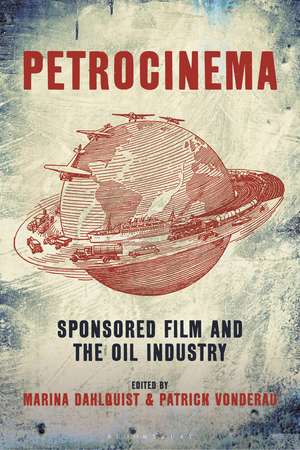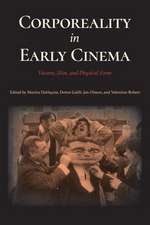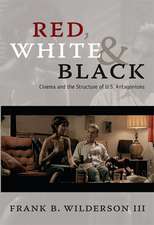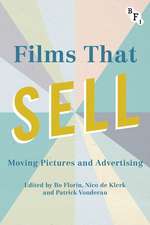Petrocinema: Sponsored Film and the Oil Industry
Editat de Marina Dahlquist, Patrick Vonderauen Limba Engleză Paperback – 24 aug 2022
| Toate formatele și edițiile | Preț | Express |
|---|---|---|
| Paperback (1) | 198.30 lei 43-57 zile | |
| Bloomsbury Publishing – 24 aug 2022 | 198.30 lei 43-57 zile | |
| Hardback (1) | 657.12 lei 43-57 zile | |
| Bloomsbury Publishing – 24 feb 2021 | 657.12 lei 43-57 zile |
Preț: 198.30 lei
Preț vechi: 258.14 lei
-23% Nou
Puncte Express: 297
Preț estimativ în valută:
37.98€ • 39.13$ • 31.81£
37.98€ • 39.13$ • 31.81£
Carte tipărită la comandă
Livrare economică 24 februarie-10 martie
Preluare comenzi: 021 569.72.76
Specificații
ISBN-13: 9781501374852
ISBN-10: 1501374850
Pagini: 272
Ilustrații: 34 bw illus
Dimensiuni: 152 x 229 mm
Greutate: 0.37 kg
Editura: Bloomsbury Publishing
Colecția Bloomsbury Academic
Locul publicării:New York, United States
ISBN-10: 1501374850
Pagini: 272
Ilustrații: 34 bw illus
Dimensiuni: 152 x 229 mm
Greutate: 0.37 kg
Editura: Bloomsbury Publishing
Colecția Bloomsbury Academic
Locul publicării:New York, United States
Caracteristici
Explores the historical role of film in informing, educating, or persuading mass audiences about this key energy resource
Notă biografică
Marina Dahlquist is a Professor of Cinema Studies at the Department for Media Studies at Stockholm University, Sweden. She recently published The Institutionalization of Educational Cinema: North America and Europe in the 1910s and 1920s (2020, with Joel Frykholm), Corporeality in Early Cinema: Viscera, Skin, and Physical Form (2018, with Doron Galili, Jan Olsson, and Valentine Robert), and Exporting Perilous Pauline: Pearl White and the Serial Film Craze (2013).Patrick Vonderau is a Professor of Media and Communication Studies at the University of Halle, Germany. Recent book publications include, among others, Advertising and the Transformation of Screen Cultures (2020, with B. Florin and Y. Zimmermann), Films that Sell: Moving Pictures and Advertising (2016, with N. de Klerk and B. Florin), and Films that Work: Industrial Film and the Productivity of Media (2011, with V. Hediger). He is also an editor of the German scholarly journal Montage AV.
Cuprins
AcknowledgementsIntroductionMarina Dahlquist and Patrick VonderauOil Rhetoric Chapter 1: Oil Media ArchivesMona DamlujiChapter 2: "All the Earmarks of Propaganda": Teapot Dome, The World Struggle for Oil, and Defining Corporate RhetoricJeremy GroskopfChapter 3: Oil Aesthetics: BP, Greenpark Productions, and the Projection of PrestigePatrick Russell and Steve FoxonAdvertisements and Sponsorship Chapter 4: On the Road with Mickey and Donald: Walt Disney, Standard Oil and the Golden Gate International Exposition of 1939Susan OhmerChapter 5: Petroleum and Hollywood Stardom: Making Way for Oil Consumption through Visual CultureMarina DahlquistChapter 6: The American Petroleum Institute: Sponsored Motion Pictures in the Service of Public RelationsGregory A. WallerChapter 7: Industrial Film and the Politics of VisibilityBrian R. JacobsonTransformation of Oil Politics Chapter 8: "In India's Life and Part of It:" Film and Visual Publicity at Burmah-Shell from the 1920s to the 1950sRavi VasudevanChapter 9: Creating Partners in Progress: Shell Communicating Oil during Nigeria's IndependenceRudmer CanjelsChapter 10: "Fuelling Apartheid:" Documentary Film in the Service of ApartheidJacqueline MaingardSelected BibliographyIndex
Recenzii
Petrocinema is a necessary collection that explores the long history of media produced by oil industries around the world. It is edited by significant, established scholars with considerable experience, and it brings together noteworthy scholars from around the world. The brilliant essays encompass detailed histories of oil-fuelled media (in the US, Nigeria, and India) alongside conceptual exploration of the role of media in fostering carbon-based economies accelerating in the post-WWII years. The book is a significant resource for scholars interested in a host of things - including the history of oil extraction, corporate propaganda, non-theatrical and documentary cinema - and its exploration of the media produced by some of the most significant corporate entities of the last three centuries is a significant and necessary task.
This timely volume offers a groundbreaking exploration of the relationship between oil, the oil industry, and cinema, showing how, across a range of places and times, petroleum and the business of its extraction have structured the moving image-and, in turn, culture, politics, and everyday life. Petrocinema is an invaluable contribution to sponsored and nonfiction media studies, industrial history, and the energy humanities alike.
This timely volume offers a groundbreaking exploration of the relationship between oil, the oil industry, and cinema, showing how, across a range of places and times, petroleum and the business of its extraction have structured the moving image-and, in turn, culture, politics, and everyday life. Petrocinema is an invaluable contribution to sponsored and nonfiction media studies, industrial history, and the energy humanities alike.























